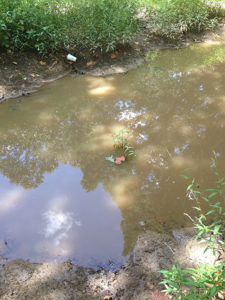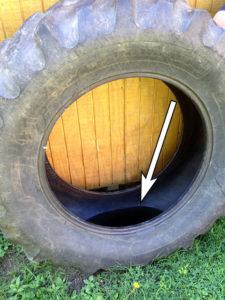“Raining” in Mosquitoes
go.ncsu.edu/readext?529177
en Español / em Português
El inglés es el idioma de control de esta página. En la medida en que haya algún conflicto entre la traducción al inglés y la traducción, el inglés prevalece.
Al hacer clic en el enlace de traducción se activa un servicio de traducción gratuito para convertir la página al español. Al igual que con cualquier traducción por Internet, la conversión no es sensible al contexto y puede que no traduzca el texto en su significado original. NC State Extension no garantiza la exactitud del texto traducido. Por favor, tenga en cuenta que algunas aplicaciones y/o servicios pueden no funcionar como se espera cuando se traducen.
Português
Inglês é o idioma de controle desta página. Na medida que haja algum conflito entre o texto original em Inglês e a tradução, o Inglês prevalece.
Ao clicar no link de tradução, um serviço gratuito de tradução será ativado para converter a página para o Português. Como em qualquer tradução pela internet, a conversão não é sensivel ao contexto e pode não ocorrer a tradução para o significado orginal. O serviço de Extensão da Carolina do Norte (NC State Extension) não garante a exatidão do texto traduzido. Por favor, observe que algumas funções ou serviços podem não funcionar como esperado após a tradução.
English
English is the controlling language of this page. To the extent there is any conflict between the English text and the translation, English controls.
Clicking on the translation link activates a free translation service to convert the page to Spanish. As with any Internet translation, the conversion is not context-sensitive and may not translate the text to its original meaning. NC State Extension does not guarantee the accuracy of the translated text. Please note that some applications and/or services may not function as expected when translated.
Collapse ▲
Poor drainage allows stormwater to accumulate and become a mosquito habitat. [Image – M. Waldvogel, NCSU]
A lot of people have gone the route of using microbial insecticides (“BTi”), such as the Mosquito Dunks, which are specific to mosquitoes and some flies (such as fungus gnats). These products are often favored because they have less overall impact on the environment particularly where spraying some other pesticides might present a potential hazard to children, pets, pollinators, etc… So, let’s not get lulled into using “Dunks” as a substitute for what should always be the *first* and *most* preferable rule of mosquito management – eliminate their source.
We should all be good neighbors by engaging in “source reduction” – removing those rain-filled temporary water sources that stagnate and can keep on cranking out mosquitoes over weeks and even months. Those breeding sources include more than just impounded water we see in drainage ditches along our streets or even on our property. They can be smaller sources that escape our attention (or we simply ignore them) – such as old tires (as seen at the right) or the wheel barrow we used and then forgot about. That problem is easily corrected by always standing the wheelbarrow upright and leaning the handles against a wall.Before it gets too hot out there, a good idea for your weekend chore list to include getting up on a ladder and cleaning out your rain gutters. While the debris on the top in the gutter may look dry, dig your hand (wearing gloves, of course) down into it and you discover a water-logged mass of decaying leaves and pine needles that attract female mosquitoes to lay their eggs.
If you do decide to spray lawns and shrubs, take the time to do it properly starting with these important steps:
- Do you have the right product? Does the label say it’s for use on landscaped areas including trees/shrubs/turf? Are you mixing it properly? Adding more than the labeled rate is not going to improve the effectiveness and it could well be more hazardous as well.
- What is your goal in treating? Sounds simple enough but some products are intended strictly to knock down mosquito numbers right now without leaving a residual amount that controls mosquitoes over the ensuing weeks. Products like “Mosquito Dunks” only kill larvae which helps reduce future mosquito populations but it does not kill the adult mosquitoes that are buzzing around your head while you’re out on your deck at night.
- If you use a gas-powered backpack mister/fogger in your yard, you need to know where the chemical is going. Pesticide sprays that travel through the air over to areas where it wasn’t intended is called “drift” and it’s illegal and potentially harmful.
- Make sure you’re dressed appropriately for applying pesticides. What direction is the wind blowing and what is downwind of where you’re treating?
- Remember “gravity” (not the movie with the same title) – what goes up (over your head) will inevitably come down and you don’t want airborne pesticide particles drifting back onto exposed skin or into your eyes or mouth, etc. Also, the higher up that you direct the spray (e.g., on your house or a tree) also increases the distance that pesticide particles may drift away from that target area.
- Remove pet water & food bowls while you are spraying. Flush out bird baths too. That will remove mosquito larvae that might be in the water and the birds will appreciate the fresh water!
- Make sure that your windows are closed.
- Give our honey bees and other pollinators a break.. Does the label instruct you not to spray when bees and other pollinators are actively foraging for pollen/nectar or does it prohibit spraying when plants are flowering at all? Try to pick products that have the least impact on bees.
- What’s in your yard? If it includes vegetable gardens, grapevines, etc., is the product labeled for application to these plants? If not, you need to cover those plants or don’t spray near them or (“Plan C”) choose another product.
- What’s on the other side of those prized shrubs lining your yard? Is it your neighbor’s yard? Your neighbor’s house? children or pets? a vegetable garden or backyard beehive? Communicate with your neighbors before you spray… It can say a lot of headaches (literally and figuratively).
- Avoid spraying near decorative outdoor fish ponds (unless you want to see how long-dead fish float at the surface of the water or what floating dead fish smell like).
Even if you follow this advice it’s still a good idea to use insect repellents carefully, particularly on small children.
Lastly, share this advice with your neighbors, tool. As I have said on previous occasions, mosquito management is best described by the adage “It takes a village”, but it only takes one “village idiot” to make it all fall apart, become ineffective and potentially harmful. the bottom line is that some old fashion physical labor, plus some common sense and communication can go along way to making mosquito management work in your neighborhood.
For more information about mosquito control, see “Mosquito Control Around Homes and in Communities.”



